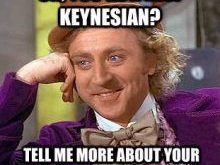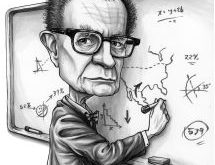from Dean Baker I have been harping on the fact that it is very likely China will be mass producing and distributing a vaccine at least a month, and quite possibly several months, before the United States. This should make people very angry. Even a month’s delay is likely to mean tens of thousands of avoidable deaths and hundreds of thousands of avoidable infections. And, it adds a month to the time period before we can get back to living normal lives. Of course, the delay could end up...
Read More »Modern macroeconomics — theory based on misleading illusions
from Lars Syll Standard new Keynesian macroeconomics essentially abstracts away from most of what is important in macroeconomics. To an even greater extent, this is true of the dynamic stochastic general equilibrium (DSGE) models that are the workhorse of central bank staffs and much practically oriented academic work. Why? New Keynesian models imply that stabilization policies cannot affect the average level of output over time and that the only effect policy can have is on the amplitude...
Read More »Artificial intelligence and the future of economics?
from Gregory Daneke and RWER issue 93 The global financial crisis that began in earnest in 2008 (and is yet to be resolved) prompted significant challenges to the theory and methods of mainstream or orthodox (also known as Neoclassical and/or Neoliberal) economics. Even distinguished orthodox economists, Paul Krugman (2009) Joseph Stiglitz (2017), and Paul Romer (2020) have joined with the crescendo of obscure, yet profound, voices, such as: “institutionalist” (e.g. Hodgson, 2004),...
Read More »The Inequality Crisis: The three options
Amazon US UK DE FR ES IT JP CA The everyday operations of our economies produce the goods and services that keep us alive and enable us to enjoy life. But that is not the only way that those operations effect our lives; they also effect societies and ecosystems. The Inequality Crisis, which threatens our societies, and the Climate Crisis, which threatens both our societies and our species, are also, no less than production, brought about directly by the everyday operations of our...
Read More »Revealed preference theory — much ado about almost nothing
from Lars Syll Twenty-seven years ago yours truly wrote an article on revealed preference theory that got published in History of Political Economy (no. 25, 1993). Paul Samuelson wrote a kind letter and informed me that he was the one who had recommended it for publication. But although he liked a lot in it, he also wrote a comment — published in the same volume of HOPE — saying: Between 1938 and 1947, and since then as Pålsson Syll points out, I have been scrupulously careful not to...
Read More »Tuesday Opening Dean Baker
Patent monopolies in prescription drugs cause corruption # 43,508
from Dean Baker Economists and economic reporters all know that tariffs can lead to corruption. The idea is that if a government-imposed tariff raises the price of a product by 10-25 percent above the free market price, companies have a large incentive to find ways to avoid the tariff. This can mean reclassifying imports to get around the tariff or trying to curry favor with politicians to get exemptions. The New York Times and ProPublica have run several excellent pieces providing...
Read More »Game theory — theory with little substantive content
from Lars Syll I don’t see that we are even entitled to assume that reality accords to some model that humans are able to envisage … To say that Pandora knows what decision model she is facing can therefore be taken as meaning no more than that she is committed to proceeding as though her model were true … The price of abandoning psychology for revealed-preference theory is therefore high. We have to give up any pretension to be offering a causal explanation of Pandora’s choice behavior...
Read More »Wealth that results only from a change in the exchange-value of some goods relative to others
from Andri Stahel and RWER issue 93 As will be argued, a great part – and increasingly so – of the capital gains result from an inflationary increase in the monetary value of given financial assets and not from productive employment of capital, generating both capital-income and new wealth on its wake. Thus, we overlook the effect of the different kinds of capital both in fostering or not overall economic activity and the effect of that which has been termed “financialisation” on the...
Read More »Why game theory fails to live up to its promise
from Lars Syll Why, it might be objected, should the goal of social science be mere causal explanations of particular events? Isn’t such an attitude more the province of the historian? Social science should instead be concentrating on systematic knowledge. The Prisoner’s Dilemma, this objection concludes, is a laudable example of exactly that – a piece of theory that sheds light over many different cases. In reply, we certainly agree that regularities or models that...
Read More » Real-World Economics Review
Real-World Economics Review






